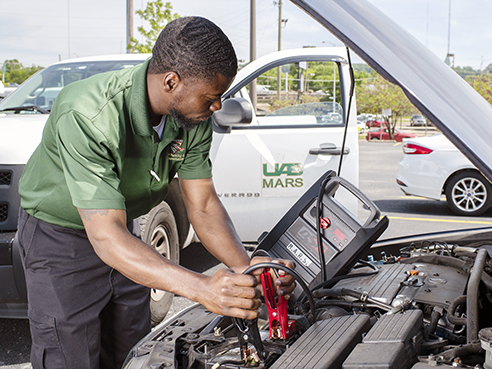 Josh Greene, parking services technician with UAB TransportationLock your keys in your car in Express Lot 4 or run out of gas driving down 10th Avenue South? Don’t worry about calling your roadside assistance company — UAB Transportation’s Motorist Assistance Roadside Service program, known as MARS, can help you resolve the issue fast and for free.
Josh Greene, parking services technician with UAB TransportationLock your keys in your car in Express Lot 4 or run out of gas driving down 10th Avenue South? Don’t worry about calling your roadside assistance company — UAB Transportation’s Motorist Assistance Roadside Service program, known as MARS, can help you resolve the issue fast and for free.
MARS is a no-cost service available to all UAB employees, students and visitors, including those at UAB Hospital and on-campus clinics, 7:30 a.m.-10 p.m. weekdays, except holidays. A quick phone call to 205-975-6277 can get you help for car trouble such as a dead battery, a flat tire, an empty gas tank or locked-in car keys.
Call MARS at 205-975-6277 for help with dead batteries, flat tires, empty gas tanks or locked cars. |
From April to June, MARS technicians resolved more than 560 service calls, according to Transportation Demand Manager Brian Atkinson. More than 50% of those were to charge a dead battery, 25% were to retrieve keys and about 14% were to put air in tires. Those numbers reflect national averages for car problems, according to data from national travel company AAA.
“We live in a busy world and UAB is a busy campus, which means that occasionally, we all have mishaps like leaving our headlights on or forgetting to grab the keys before we lock our cars,” said Andre Davis, director of UAB Transportation. “Our MARS team is on-hand to help resolve the issue and get you on your way.”